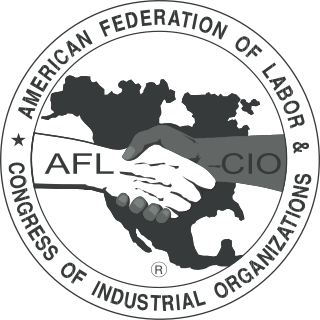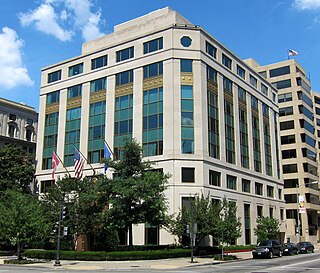Related Research Articles

The American Federation of Labor and Congress of Industrial Organizations (AFL-CIO) is a national trade union center that is the largest federation of unions in the United States. It is made up of 60 national and international unions, together representing more than 12 million active and retired workers. The AFL-CIO engages in substantial political spending and activism, typically in support of progressive and pro-labor policies.

The American Federation of Labor was a national federation of labor unions in the United States that continues today as the AFL-CIO. It was founded in Columbus, Ohio, in 1886 by an alliance of craft unions eager to provide mutual support and disappointed in the Knights of Labor. Samuel Gompers was elected the full-time president at its founding convention and was re-elected every year except one until his death in 1924. He became the major spokesperson for the union movement.
The United Food and Commercial Workers International Union (UFCW) is a labor union representing approximately 1.3 million workers in the United States and Canada in industries including retail; meatpacking, food processing and manufacturing; hospitality; agriculture; cannabis; chemical trades; security; textile, and health care. UFCW is affiliated with the Canadian Labour Congress (CLC) and the AFL–CIO; it disaffiliated from the AFL–CIO in 2005 but reaffiliated in 2013. UFCW is also affiliated to UNI Global Union and the IUF.

The Laborers' International Union of North America, often shortened to just the Laborers' Union, is an American and Canadian labor union formed in 1903. As of 2017, they had about 500,000 members, about 80,000 of whom are in Canada. The current general president is Brent Booker who was appointed general president in 2023. There are nine regions across North America; these regions are further divided into 500 local unions. One region is in Toronto, Canada, and is led by Joseph Mancinelli, Local 183, which is the largest construction local union in North America.
The Office and Professional Employees International Union (OPEIU) is a trade union in the United States and Canada representing approximately 88,000 white-collar working people in the public and private sectors. It has members in all 50 US states, the District of Columbia, and Puerto Rico, as well as in one local in Canada.

The International Organization of Masters, Mates & Pilots or MM&P is a United States labor union representing licensed mariners.

The Seafarers International Union or SIU is an organization of 12 autonomous labor unions of mariners, fishermen and boatmen working aboard vessels flagged in the United States or Canada. Michael Sacco was its president from 1988 until 2023. The organization has an estimated 35,498 members and is the largest maritime labor organization in the United States. Organizers founded the union on October 14, 1938. The Seafarers International Union arose from a charter issued to the Sailors Union of the Pacific by the American Federation of Labor as a foil against loss of jobs to the Congress of Industrial Organizations (CIO) and its Communist Party-aligned faction.

The Bakery, Confectionery, Tobacco Workers and Grain Millers International Union (BCTGM) is a labor union in the United States and Canada primarily representing workers in the food processing industry. The union was established in 1886 as the Journeyman Bakers Union. The contemporary BCTGM was formed in January 1999 as a merger of the Bakery, Confectionery and Tobacco Workers' International Union and the American Federation of Grain Millers.

James Duncan was a Scottish American union leader, and president of the Granite Cutters' International Association from 1895 until his death in 1928. He was an influential member of the American labor movement, helping to co-found the American Federation of Labor.

The International Plate Printers, Die Stampers and Engravers Union of North America is a North American labor union, one of the constituent members of the Department for Professional Employees of the AFL–CIO; and of the Canadian Labour Congress, founded in 1893. It is the result of a number of mergers of labor unions, and is headquartered in Silver Spring, Maryland
The International Spinners' Union (ISU) was a labor union representing cotton spinners in the United States.
The United Wall Paper Craftsmen of North America (UWPC) was a labor union representing wallpaper cutters and printers in the United States and Canada.
The Window Glass Cutters' League of America (WCGLA) was a labor union representing workers involved in making flat glass in the United States.
The American Flint Glass Workers' Union (AFGWU) was a labor union representing workers involved in making glassware and related goods in the United States and Canada.
The International Leather Goods, Plastic and Novelty Workers' Union (ILGPNWU) was a trade union representing workers involved in making bags, belts and similar goods, in the United States and Canada.
The International Jewelry Workers' Union (IJWU) was a labor union representing workers involved in making jewelry in the United States and Canada.
The United Rubber, Cork, Linoleum and Plastic Workers of America (URW) was a labor union representing workers involved in manufacturing using specific materials in the United States and Canada.
The Tile, Marble, Terrazzo, Finishers', Shopworkers' and Granite Cutters' International Union (TMT) was a labor union representing construction workers who used marble and similar decorative materials, in the United States and Canada.
The Journeymen Stonecutters' Association of North America (JSANA) was a labor union representing workers involved in cutting and shaping stone for construction in the United States and Canada.
The Leather Workers' International Union of America (LWU) was a labor union representing workers in the leather industry in the United States and Canada.
References
- 1 2 Bulletin of the United States Bureau of Labor Statistics. U.S. Government Printing Office. 1936. pp. 123–124.
- ↑ "Advantage-Preservaion". westerly.historyarchives.online. Retrieved 2024-11-10.
- ↑ "Advantage-Preservaion". westerly.historyarchives.online. Retrieved 2024-11-10.
- ↑ "Advantage-Preservaion". westerly.historyarchives.online. Retrieved 2024-11-10.
- ↑ "Advantage-Preservaion". westerly.historyarchives.online. Retrieved 2024-11-10.
- ↑ "Albion Man Chosen". Buffalo Evening News. 5 November 1907. p. 16.
- ↑ "Inactive Organizations" (PDF). UMD Labor Collections. University of Maryland. Retrieved 18 April 2022.
- ↑ Directory of Labor Unions in the United States (PDF). Washington DC: United States Department of Labor. 1953. Retrieved 2 April 2022.
- ↑ Directory of National and International Labor Unions in the United States (PDF). Washington DC: United States Department of Labor. 1957. Retrieved 18 April 2022.